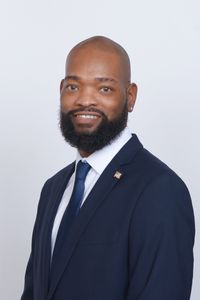Kenneth Morgan-Aguilera
Kenneth Morgan-Aguilera (Democratic Party) is running for election to the U.S. House to represent Texas' 12th Congressional District. He is on the ballot in the Democratic primary on March 3, 2026.[source]
Morgan-Aguilera completed Ballotpedia's Candidate Connection survey in 2025. Click here to read the survey answers.
Biography
Kenneth Morgan-Aguilera served in the U.S. Army. He earned a Ph.D. from the South College. His career experience includes working as a business executive.[1]
Elections
2026
See also: Texas' 12th Congressional District election, 2026
General election
The primary will occur on March 3, 2026. The general election will occur on November 3, 2026. General election candidates will be added here following the primary.
Democratic primary election
Democratic primary for U.S. House Texas District 12
Kenneth Morgan-Aguilera and Heli Rodriguez Prilliman are running in the Democratic primary for U.S. House Texas District 12 on March 3, 2026.
 = candidate completed the Ballotpedia Candidate Connection survey. = candidate completed the Ballotpedia Candidate Connection survey. | ||||
| If you are a candidate and would like to tell readers and voters more about why they should vote for you, complete the Ballotpedia Candidate Connection Survey. | ||||
Do you want a spreadsheet of this type of data? Contact our sales team. | ||||
Republican primary election
Republican primary for U.S. House Texas District 12
Incumbent Craig Goldman is running in the Republican primary for U.S. House Texas District 12 on March 3, 2026.
Candidate | ||
 | Craig Goldman | |
 = candidate completed the Ballotpedia Candidate Connection survey. = candidate completed the Ballotpedia Candidate Connection survey. | ||||
| If you are a candidate and would like to tell readers and voters more about why they should vote for you, complete the Ballotpedia Candidate Connection Survey. | ||||
Do you want a spreadsheet of this type of data? Contact our sales team. | ||||
Withdrawn or disqualified candidates
- Brian Sprague (R)
- Semaj Swire (R)
Endorsements
Ballotpedia is gathering information about candidate endorsements. To send us an endorsement, click here.
Campaign themes
2026
Ballotpedia survey responses
See also: Ballotpedia's Candidate Connection
Kenneth Morgan-Aguilera completed Ballotpedia's Candidate Connection survey in 2025. The survey questions appear in bold and are followed by Morgan-Aguilera's responses.
| Collapse all
His goal is to bring people together to find solutions to the pressing issues facing our district and nation, from education and healthcare to economic growth and community development.
As our next U.S. Representative, Kenneth will work hard to create jobs, support labor unions, boost local small businesses, fight for our veterans, make health care affordable for all, support educational opportunities for our children & grandchildren, defend women's reproductive rights, protect Social Security & Medicare for our senior citizens, and work to end systemic inequities in our society to ensure equality and justice for all.
Kenneth is committed to being a voice for the voiceless and a champion for the values of hard work, personal responsibility, and perseverance that have guided him throughout his life. He will work tirelessly for a brighter future for all Texans.- Empowering Economic Growth: I'll work to create jobs, support labor unions, and boost local small businesses to strengthen our economy and benefit all Texans.
- Education: My focus will be on making healthcare affordable for everyone, supporting educational opportunities, and defending women's reproductive rights to ensure a healthier and more educated community.
- Fighting for Equality and Justice: As your representative, I'll strive to end systemic inequities, protect Social Security and Medicare for our senior citizens, and advocate for the values of hard work, personal responsibility, and perseverance that have guided my life.
Economic Growth and Development
1. Job creation Supporting initiatives that promote job growth, entrepreneurship, and workforce development.
2. Small business support: Encouraging policies that benefit local small businesses and stimulate economic growth.
Healthcare and Education
1. Affordable healthcare Advocating for policies that make healthcare accessible and affordable for all.
Foundational Texts
- "The Republic" by Plato: Explores justice and the ideal society.
- "The Prince" by Niccolò Machi and "Leviathan" by Thomas Hobbes: Examine power, governance, and the social contract.
- "Second Treatise of Government" by John Locke: Argues for individual rights, liberty, and government's role.
Modern Perspectives
- "A Theory of Justice" by John Rawls: Explores justice as fairness and the state's role.
- "Anarchy, State, and Utopia" by Robert Nozick: Challenges traditional governance and individual rights.
- "The Origins of Totalitarianism" by Hannah Arendt: Analyzes totalitarian regimes and individual freedoms.
Personal Accounts and Essays
- "Narrative of the Life of Frederick Douglass": Sheds light on slavery and civil rights.
- "The Second Sex" by Simone de Beauvoir: Explores equality and women's roles.
Understanding My Philosophy
Integrity and Ethics
1. Honesty and Transparency: Being truthful and open in their words and actions.
2. Accountability: Taking responsibility for their decisions and actions.
Effective Communication
1. Active Listening: Listening to the concerns and needs of their constituents.
2. Clear Communication: Clearly articulating their vision, policies, and decisions.
Leadership and Vision
1. Visionary Thinking: Having a clear understanding of the community's needs and developing policies to address them.
2. Collaboration and Partnership: Working with various stakeholders to achieve common goals.
Compassion and Empathy
1. Empathy: Understanding and relating to the experiences and challenges of their constituents.
2. Compassion: Showing concern and care for the well-being of their constituents.
Responsiveness and Adaptability
1. Responsiveness: Being accessible and responsive to the needs and concerns of their constituents.
2. Adaptability: Being willing to adapt to changing circumstances and needs.
Representation
1. Listening to constituents: Understanding their needs, concerns, and values.
2. Advocating for constituents: Representing their interests and advocating for their needs.
Policy-Making
1. Developing policies: Creating and implementing policies that benefit the community.
2. Making informed decisions: Using data, research, and expertise to inform decision-making.
Accountability
1. Being transparent: Providing clear and timely information about decisions and actions.
2. Being accountable: Taking responsibility for decisions and actions, and being answerable to constituents.
Community Engagement
1. Building relationships: Fostering strong relationships with community leaders, organizations, and stakeholders.
2. Engaging with the community: Participating in community events, listening to concerns, and providing updates on progress.
Fiscal Responsibility
1. Managing resources: Ensuring responsible management of public resources and funds.
2. Making sound financial decisions: Prioritizing spending and making informed financial decisions that benefit the community.
A Turning Point
Skills Learned
1. Customer service: Dealing with customers and ensuring their satisfaction.
2. Teamwork: Working with colleagues to achieve common goals.
3. Time management: Managing your time effectively to meet deadlines and complete tasks.
Lasting Impact
Representative Democracy
1. Direct representation: Members of the House are directly elected by the people, ensuring that the voices and concerns of citizens are represented.
2. Proportional representation: The number of representatives each state has is based on its population, providing a proportional representation of the country's diverse population.
Legislative Power
1. Lawmaking authority: The House has the power to introduce and pass legislation, making it a crucial part of the federal lawmaking process.
2. Impeachment power: The House has the sole power of impeachment, allowing it to hold federal officials accountable for their actions.
Accountability and Oversight
1. Regular elections: Members of the House are elected every two years, ensuring that they remain accountable to their constituents.
2. Oversight responsibilities: The House has a critical role in conducting oversight of the executive branch and federal agencies, ensuring that they are acting in the best interests of the country.
Diversity and Representation
1. Diverse membership: The House has a diverse membership, reflecting the country's growing diversity and providing a platform for underrepresented voices.
2. Representative of the people: The House is designed to be representative of the people, with members elected to serve the interests of their constituents.
Checks and Balances
1. Balance of power: The House plays a crucial role in the system of checks and balances, ensuring that no one branch of government has too much power.
2. Collaboration with other branches: The House works in conjunction with the Senate and the executive branch to pass legislation and conduct the business of government.
Benefits of Fresh Perspectives
1. Innovative thinking: Newcomers can bring fresh ideas and approaches that might not be hindered by traditional thinking.
2. Diverse backgrounds: Representatives from various fields can provide unique insights, enriching the legislative process.
3. Adaptability: Newcomers might be more agile in responding to changing circumstances and needs.
Value of Experience
1. Understanding government mechanics: Familiarity with bureaucratic processes can facilitate effective governance.
2. Networking and relationships: Established connections within the government and party can ease collaboration.
3. Policy expertise: Experience in specific areas can inform and enhance decision-making.
Economic Challenges
1. Inflation and Healthcare Affordability: Rising healthcare costs and inflation are major concerns for many Americans.
2. Federal Budget Deficit: The federal budget deficit is a significant issue, with debt projected to grow faster than the economy.
National Security Challenges
1. China's Military and Cyber Threats: China's growing military and cyber capabilities pose a significant threat to the US.
2. Russia, Iran, and North Korea: These countries are challenging the US through deliberate campaigns and military actions.
Public Health Challenges
1. Rising Healthcare Costs: Increasing healthcare costs are a major issue, with many Americans struggling to afford healthcare.
2. Pandemics and Infectious Diseases: The US needs to be prepared for pandemics and infectious diseases, with a focus on public health infrastructure and emergency preparedness.
Technological Challenges
1. Cybersecurity Threats: The US faces growing cybersecurity threats, with a need for a comprehensive national cybersecurity strategy.
2. Artificial Intelligence and Emerging Technologies: The US must stay ahead in AI and emerging technologies, with a focus on research and development, innovation, and responsible use.
Social Challenges
1. Partisan Divide: The partisan divide is a significant challenge, with Americans expressing concerns about the ability of Republicans and Democrats to work together.
Potential Benefits of Longer Terms
1. More stability and focus on governance: Longer terms could provide representatives with more time to develop and implement policies.
2. Reduced campaigning and fundraising: Less frequent elections might decrease the emphasis on campaigning and fundraising.
Potential Drawbacks of Longer Terms
1. Reduced accountability: Longer terms could make representatives less accountable to their constituents.
2. Less opportunity for new voices: Less frequent elections might limit opportunities for new candidates to be elected.
Benefits of Term Limits
1. Promoting accountability: Term limits can help prevent elected officials from becoming too comfortable in their positions and losing touch with their constituents.
2. Fresh perspectives: Term limits can bring new ideas and perspectives to government, which can help address complex problems and challenges.
3. Reducing corruption: Term limits can reduce the influence of special interests and prevent corruption by limiting the amount of time elected officials can spend in office.
Drawbacks of Term Limits
1. Loss of experience: Term limits can result in the loss of experienced and knowledgeable elected officials, which can be detrimental to effective governance.
2. Increased influence of special interests: Term limits can actually increase the influence of special interests, as elected officials may be more focused on their post-office careers and less accountable to their constituents.
3. Reduced accountability: Term limits can reduce accountability, as elected officials may feel less accountable to their constituents and more focused on their own career advancement.
Alternative Approaches
1. Term limits with exceptions: Consider implementing term limits with exceptions for certain positions or circumstances, such as allowing for longer terms for committee chairs or leaders of key committees.
2. Strengthening campaign finance laws: Implement stronger campaign finance laws to reduce the influence of special interests and promote accountability.
3. Improving transparency and accountability: Implement measures to improve transparency and accountability, such as regular audits and evaluations of government programs.
Benefits of Compromise
1. Finding common ground: Compromise enables policymakers to find common ground and reach agreements, even when there are significant differences in opinion.
2. Balancing competing interests: Compromise helps to balance competing interests and priorities, ensuring that diverse perspectives are considered.
3. Building coalitions: Compromise can facilitate the building of coalitions and partnerships, which can be essential for passing legislation.
Challenges of Compromise
1. Principle vs. pragmatism: Policymakers may face challenges in balancing their principles with the need for compromise and pragmatism.
2. Finding mutually beneficial solutions: Compromise can be difficult when policymakers have deeply held convictions or when there are significant power imbalances.
3. Maintaining accountability: Compromise can sometimes lead to concerns about accountability, particularly if policymakers are seen as compromising on key issues.
Effective Compromise
1. Building trust: Effective compromise requires building trust among policymakers, stakeholders, and constituents.
2. Active listening: Policymakers must engage in active listening to understand diverse perspectives and find common ground.
3. Creative problem-solving: Compromise often requires creative problem-solving and a willingness to think outside the box.
Fiscal Responsibility
1. Budgetary oversight: I would ensure that any revenue-raising bills are carefully crafted to promote fiscal responsibility and transparency.
2. Taxation reform: I would prioritize tax reform that promotes fairness, simplicity, and economic growth.
Representation of Constituents
1. Listening to constituents: I would engage with my constituents to understand their concerns and priorities regarding taxation and revenue.
2. Representing local interests: I would ensure that any revenue-raising bills reflect the needs and values of my district.
Accountability and Transparency
1. Transparent budgeting: I would advocate for transparent budgeting processes to ensure that taxpayers understand how their money is being spent.
2. Accountable governance: I would hold the executive branch accountable for effective and efficient use of taxpayer dollars.
Oversight of the Executive Branch
1. Investigating executive actions: The House can investigate executive branch actions, such as executive orders, regulations, and policy decisions.
2. Oversight of federal agencies: The House can conduct oversight of federal agencies to ensure they are operating effectively and efficiently.
Addressing Corruption and Misconduct
1. Investigating corruption: The House can investigate allegations of corruption, such as bribery, embezzlement, or other forms of malfeasance.
2. Addressing misconduct: The House can investigate allegations of misconduct, such as abuse of power or violations of law.
Informing Policy Decisions
1. Conducting policy research: The House can conduct research and investigations to inform policy decisions and ensure that laws are effective.
2. Gathering information: The House can gather information from experts, stakeholders, and other sources to inform policy decisions.
Ensuring Transparency and Accountability
1. Conducting public hearings: The House can conduct public hearings to ensure transparency and accountability in government.
2. Requiring documentation: The House can require documentation and evidence from the executive branch to ensure accountability.
Economic Development Committee
1. Promoting local economic growth: This committee focuses on initiatives to stimulate economic development, create jobs, and attract businesses to our area.
2. Supporting small businesses and entrepreneurs: I am interested in helping small businesses and entrepreneurs access resources, funding, and support to thrive.
Education Committee
1. Improving educational outcomes: This committee works to enhance educational programs, increase funding, and address issues affecting student success.
2. Supporting teachers and educators: I believe in recognizing the importance of teachers and educators and providing them with the resources and support they need to excel.
Healthcare Committee
1. Addressing healthcare disparities: This committee focuses on identifying and addressing healthcare disparities, improving access to care, and promoting health equity.
2. Developing healthcare policies: I am interested in shaping healthcare policies that prioritize patient-centered care, affordability, and accessibility.
Environmental Committee
1. Promoting sustainability and conservation: This committee works to develop initiatives that protect our environment, promote sustainability, and conserve natural resources.
2. Addressing climate change: I believe in taking action to mitigate the effects of climate change and promote environmentally friendly practices.
Public Safety Committee
1. Enhancing community safety: This committee focuses on initiatives to improve public safety, reduce crime, and enhance emergency response services.
Financial Transparency
1. Open budgeting: I support making budget documents and financial information easily accessible to the public, so that citizens can understand how their tax dollars are being spent.
2. Disclosure of financial interests: I believe that elected officials and government employees should be required to disclose their financial interests, to prevent conflicts of interest and ensure that decisions are made in the public's best interest.
Government Accountability
1. Independent oversight: I support establishing independent oversight bodies, such as audit agencies and ethics commissions, to ensure that government agencies are held accountable for their actions.
2. Transparency in decision-making: I believe that government decision-making processes should be transparent, with clear explanations for decisions and actions.
Whistleblower Protection
1. Protecting whistleblowers: I support protecting whistleblowers who come forward to report wrongdoing or misconduct, to ensure that those who speak out are not retaliated against.
Public Participation
1. Encouraging public participation: I believe that citizens should have opportunities to participate in the decision-making process, through public hearings, town hall meetings, and other forums.
Note: Ballotpedia reserves the right to edit Candidate Connection survey responses. Any edits made by Ballotpedia will be clearly marked with [brackets] for the public. If the candidate disagrees with an edit, he or she may request the full removal of the survey response from Ballotpedia.org. Ballotpedia does not edit or correct typographical errors unless the candidate's campaign requests it.
Campaign finance summary

See also
2026 Elections
External links
Footnotes
- ↑ Information submitted to Ballotpedia through the Candidate Connection survey on April 9, 2025









